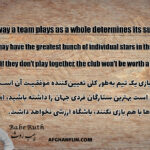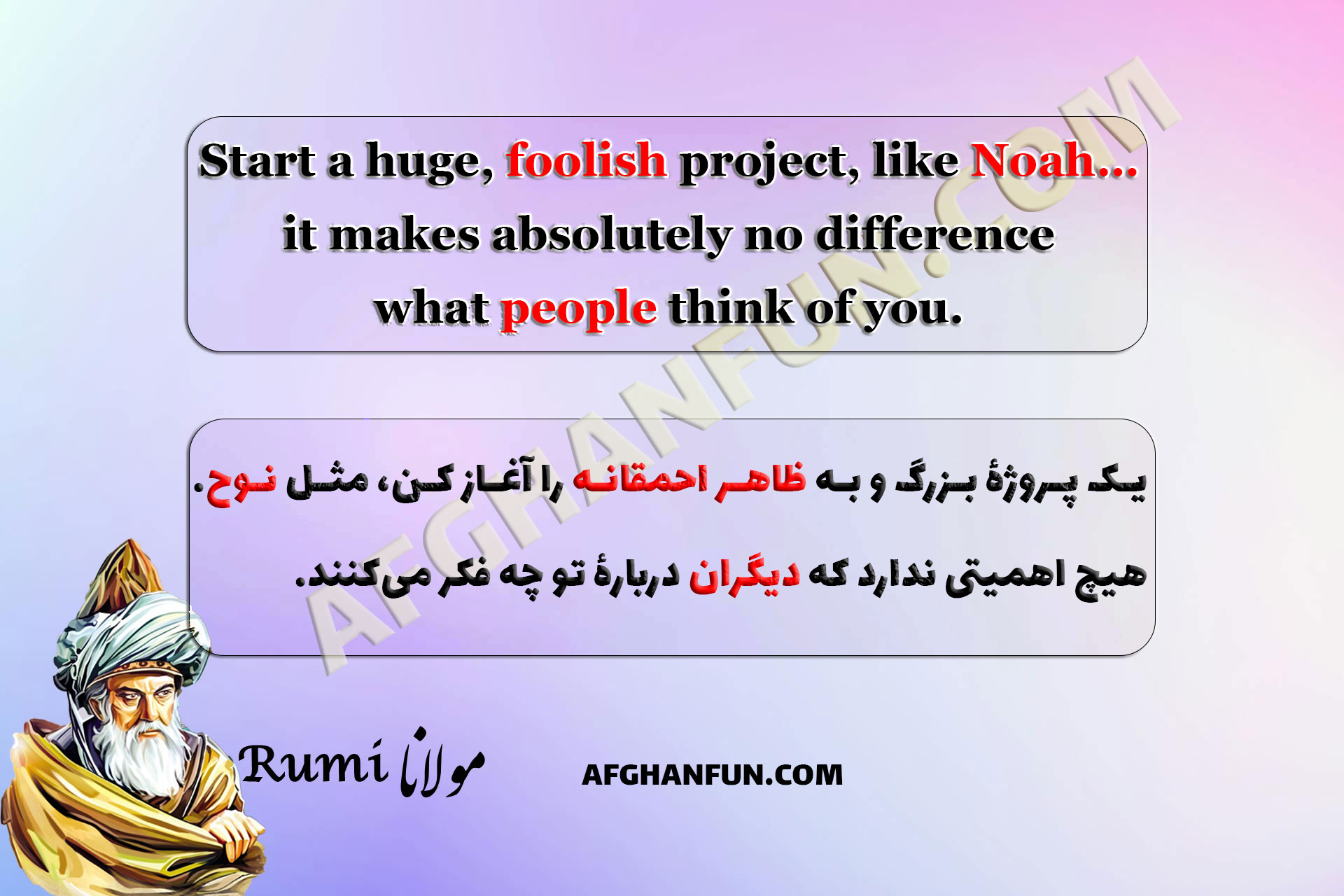Start Something Big: Rumi’s Wisdom on Bold Dreams
Start a huge, foolish project, like Noah…it makes absolutely no difference what people think of you.
Rumi
یک پروژهٔ بزرگ و به ظاهر احمقانه را آغاز کن، مثل نوح… هیچ اهمیتی ندارد که دیگران دربارهٔ تو چه فکر میکنند.
مولانا
این نقل قول به ما یادآوری میکند که برای انجام کارهای بزرگ و الهامبخش، نباید نگران قضاوتهای دیگران باشیم. همانطور که نوح با اراده و ایمان قوی کشتی خود را ساخت، باید شجاعت داشته باشیم که رویاهای بزرگ خود را دنبال کنیم، حتی اگر احمقانه یا غیرممکن به نظر برسند. حقیقت این است که خلاقیت و موفقیت اغلب در دل همین دیوانگیها نهفته است.
Go Big, Go Bold, Go Foolish: Rumi’s Guide to Action
Як лоиҳаи бузург ва ба назари баъзеҳо аҳмақонаро оғоз кун, мисли Нӯҳ… Ҳеҷ аҳамият надорад, ки дигарон дар бораи ту чӣ фикр мекунанд.
МАВЛОНО ҶАЛОЛУДДИН МУҲАММАДИ БАЛХӢ
Ин иқтибос моро водор мекунад, ки барои иҷрои корҳои бузург аз фикрҳои дигарон натарсем. Мисли Нӯҳ, ки бо ирода ва боварии қавӣ киштии худро сохт, мо низ бояд ҷасорат дошта бошем, ки орзуҳои бузурги худро пайгирӣ кунем, ҳатто агар онҳо девонагӣ намоянд. Ҳақиқат он аст, ки эҷодкорӣ ва муваффақият аксар вақт дар ҳамин “девонагиҳо” нуҳуфтаанд.
Freedom From Opinion: Rumi’s Path to Authentic Action
ابدأ مشروعًا ضخمًا ومجنونًا مثل نوح… لا يهم على الإطلاق ما يظنه الناس عنك.
مولانا جلال الدین محمد الرومي
هذا الاقتباس يذكرنا بأننا يجب ألا نخاف من أحكام الآخرين عندما نسعى لتحقيق أمور عظيمة. مثلما بنى نوح سفينته بإرادة وإيمان قويين، علينا أن نتحلى بالشجاعة لمتابعة أحلامنا الكبيرة، حتى لو بدت مجنونة أو مستحيلة. الحقيقة أن الإبداع والنجاح غالبًا ما يختبئان في قلب هذه “الجنون”.
Build Your Ark, Ignore the Storm: Rumi’s Blueprint for Bold Action
This quote by Rumi, “Start a huge, foolish project, like Noah…it makes absolutely no difference what people think of you,” carries a deep philosophical and spiritual meaning, calling for boldness in pursuing one’s purpose without fear of judgment or societal expectations.
1. The Call for Boldness and Risk-taking
The reference to “Noah” invokes a story from the Bible, where Noah embarks on the monumental task of building an ark in preparation for a great flood. In the context of Rumi’s quote, Noah’s actions represent an immense, seemingly irrational undertaking—a task that the people around him would have considered foolish, as they could not foresee the necessity of an ark. Noah was deeply connected to his purpose, regardless of the external ridicule or disbelief he faced.
In this context, Rumi is encouraging us to start bold, ambitious projects, even if they appear foolish or impractical to others. The phrase “huge, foolish project” emphasizes the idea of taking on something vast, something that may be beyond ordinary comprehension or that might seem impossible. It’s about stepping out of the comfort zone and committing to something bigger than oneself, despite potential risks, challenges, or doubts.
2. The Absence of Concern for External Judgment
Rumi’s assertion that “it makes absolutely no difference what people think of you” highlights the irrelevance of societal judgment when it comes to following your inner calling. Often, people avoid pursuing dreams or projects because they fear the opinions of others—fear of being seen as foolish, incapable, or unrealistic. Rumi’s message here is a rejection of this external validation, urging individuals to prioritize their own vision and sense of purpose above what others might say or think.
This freedom from the judgment of others is a call to authenticity. True innovation or spiritual growth often requires doing things that others might find strange or impractical. Rumi emphasizes that following one’s own path, regardless of public opinion, is the essence of living a meaningful life.
3. The Symbol of the “Foolish Project”
The idea of the “foolish project” itself is significant. The term “foolish” is often linked with wisdom in spiritual traditions. The “fool” is not ignorant but open-minded, free of conventional thinking. In many spiritual teachings, the fool is the one who steps outside the bounds of societal norms and reaches toward the unknown with faith. In Rumi’s view, the so-called “foolish” project can be a metaphor for the leap of faith that transcends reason and embraces the unknown, trusting that there is a deeper wisdom behind the outwardly foolish endeavor.
This foolishness also suggests humility. A person starting a bold project may face challenges, setbacks, and failure, but it is in the process of pursuing that “foolish” dream where real growth and transformation occur. In pursuing something grand with little concern for how it might appear to others, one engages in a process of becoming more authentic and in tune with their deeper self.
4. The Connection to Divine Purpose
Noah’s mission was divinely inspired. While his contemporaries ridiculed him, his work was a crucial part of a larger plan. Rumi is likely alluding to the idea that when we are aligned with a higher purpose, we should trust that purpose regardless of its reception. Just as Noah’s “foolish” project had divine significance, so too can our own “huge, foolish” undertakings, if they are pursued with faith and determination, hold meaning beyond immediate understanding.
5. Embracing the Uncertainty of Life
The concept of starting a “foolish project” also involves embracing the uncertainty inherent in life. To embark on an endeavor like Noah’s, one must trust in the unseen and act without certainty of outcome. This is a recognition that life is full of uncertainties, and one cannot control the reactions of others, nor can they predict the results of their actions. Instead of avoiding the unknown, Rumi encourages us to embrace it, to leap without knowing what will happen next, trusting in the divine or the natural unfolding of things.
6. The Archetype of Noah in Rumi’s Spiritual Thought
In the broader context of Rumi’s spiritual philosophy, Noah is an archetype of someone who listens to the inner calling, regardless of external doubts. He becomes a symbol of unwavering faith and courage in the face of adversity. In the Sufi tradition, the inner journey often requires such blind faith—faith not in a particular outcome, but in the process and in the divine guidance that accompanies the individual.
Conclusion
Rumi’s quote is a profound encouragement to embark on projects that may seem grand, risky, or even illogical by societal standards. It advocates for acting with courage, not concerning oneself with the judgments of others, and trusting in one’s inner calling. Through the metaphor of Noah, Rumi invites us to start our own “huge, foolish projects” and to recognize that, even if they appear to others as foolish, they might be deeply significant on a spiritual level, helping us grow beyond our limitations and connect with a higher purpose.
External links:
This Rumi quote, found on “Goodreads“











